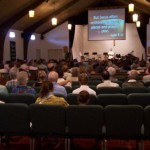Gotta keep the main thing the main thing… and the main thing is the Sunday event?
Hamo at “Backyardmissionary” is doing some reflection in his post “Get Sunday right and the rest will take care of itself.” In fact, he’s reflecting back 9 years to his very first blog post that had the same title: “Get Sunday right and the rest will take care of itself.”
Now… he’s not so sure. He says that way of thinking was naive, foolish, absurd.
There are several good parts of his post, but I’ll point out a few:
I really cannot imagine Jesus and the apostles ever sitting around during the week and asking the question ‘ok – how are we going to do sabbath this week?’ I don’t see from the NT that their lives revolved around the planning and execution of one major weekly event.
Surely they would have told us about it if it was that important?…
Hmmm…
But I do see that their lives revolved around tight relationships with each other and around questions of how they lived out their radical devotion to Christ in the world they were a part of. I see them very focused on living and demonstrating the kingdom of God in many different ways thru everyday life.
————————
Jesus called us to a life – a life in community – and that will inevitably involve meeting, but I would forgive anyone who interpreted Christianity to be a weekly commitment to a Sunday event – because so much of what is communicated (often unconsciously) is exactly that.
————————
However shifting people’s deeply entrenched understandings of church, mission and the kingdom is something I baulk at because it inevitably involves pain and conflict. It inevitably involves being misunderstood and maybe even cast in the light of a villain who just wants to screw things up. And very few people are intentionally obstructive – its just how we have been trained to think…
So some days I sit and wonder. Is it worth it?
I know that getting Sunday right is not the answer but the primary platform to speak to this expression of church is… you guessed it… Sunday…
Is the solution part of the problem?…
I love these kinds of posts: honest, passionate, filled with the real pain and struggles of life. Yes, for most of Christianity, the Sunday event is the main thing… I’ve even heard the “Sunday morning worship service” referred to as “the main event.” (Oh, I know that most Christians would say that Jesus is the main thing…)
So… if most people think that the Sunday morning worship service is “the main thing,” is it possible to communicate otherwise outside of that event? Isn’t anything said or done outside of that context considered to be less important, less normative, less Christian?
Or, is there another solution? Is there another way to teach people that the Sunday morning worship service is not the pinnacle of following Jesus?
Audience of One?
Have you heard someone say before that Christians always perform for an audience of one? Whether that person is preaching, teaching, singing, dancing, praying, whatever, everything is always done for an audience of one – meaning God, of course.
In a sense, I understand what that means. Obviously, everything that we do can and should be done for the glory of God. However, that does not mean that God is our only “audience.” In fact, there is at least one context where we should NOT act only as if we are alone and acting for God.
What is that context? Whenever we are with other Christians. (There may be other contexts as well, but this is the context that I’m going to examine.)
To begin with, there are several activities that Jesus’ followers often say should be done only for God. For example, some say that good deeds or works of righteousness should only be done for God (and some would say that only God should know about these activities). Of course, this is one possible interpretation of Matthew 6:1-4. However, this interpretation fails to take into account those times when we are specifically instructed to do good deeds in a manner that others see and recognize those actions for what they are. For a few examples, see Matthew 5:13-16 or the many passages in which one of the authors of Scripture offer their own good deeds as an example for others to follow or in which we are exhorted to live in a manner that others can see our good deeds as well.
Often, fasting as presenting as an activity that should be done for an audience of one. Again, there is a particular passage that can be interpreted to mean that we should never let others know that we are fasting: Matthew 6:16-18. However, we know about every fast in Scripture (i.e., the fasts are not “secret”), and we even have several examples of group fasts in which the group obviously knew that the others were fasting. (For example, see Acts 13:2-3 and Acts 14:23.)
But, there is a passage of Scripture in which believers are specifically instructed NOT to do things only for an audience of one – i.e., things should not be done only for God. This passage, of course, is 1 Corinthians 14. After explaining that people do not generally understand what is spoken through tongues (without interpretation), Paul says:
Therefore, one who speaks in a tongue should pray for the power to interpret. For if I pray in a tongue, my spirit prays but my mind is unfruitful. What am I to do? I will pray with my spirit, but I will pray with my mind also; I will sing praise with my spirit, but I will sing with my mind also. Otherwise, if you give thanks with your spirit, how can anyone in the position of an outsider say “Amen” to your thanksgiving when he does not know what you are saying? For you may be giving thanks well enough, but the other person is not being built up. I thank God that I speak in tongues more than all of you. Nevertheless, in church I would rather speak five words with my mind in order to instruct others, than ten thousand words in a tongue. (1 Corinthians 14:13-19 ESV)
Similarly, when specifically giving instructions to those who have been given a tongue (by the Holy Spirit), Paul writes:
If any speak in a tongue, let there be only two or at most three, and each in turn, and let someone interpret. But if there is no one to interpret, let each of them keep silent in church and speak to himself and to God. (1 Corinthians 14:27-28 ESV)
Paul does not deny that the tongue is a gift of the Spirit. Nor does he ever deny that the tongue can be beneficial to the one speaking it. He never says that God does not desire for the person to exercise that gift (tongues). However, Paul consistently states the same admonition: When gathered with the church (i.e., other Christians) always and only do and say things that will benefit the group. Thus, God is not our only audience. We must be concerned with what others will understand and how our words and/or actions will benefit them (i.e. for edification).
It is perhaps surprising that Paul even includes prayer in these instructions. If others cannot understand your prayer, then Paul says it should not be spoken (even if it is spoken directly to God). Why? Because we are speaking both to God and for the benefit of others (i.e., for their edification). Even prayer.
Of course, if you read any of Paul’s letters, you will see that he almost always included a prayer. Why would he write out a prayer if it was only for God? Because it was not only for God; it was also for the encouragement of his readers.
Yes, everything we do should be done for the glory of God. We should do everything recognizing that God is our audience. But, when we are with other believers, God is not our ONLY audience. We should also keep the others around us in mind, and do everything for their edification as well.
Online community and discipleship?
Once again I want to point you to a post by Miguel at “God-Directed Deviations.” This post is called “Virtual Community & Virtual Discipleship.”
Miguel is asking some very good questions about the role of online communication both in developing community and in helping people follow Jesus Christ. As with many of his posts, there is some good discussion in the comments.
As part of his post, Miguel says:
If we say that there are no virtual communities, then the issue of online discipleship is moot. If we say, however, that virtual or online communities do and can exist, then some would have to “Go” to those communities, no problem – “Teach them to observe all things that Christ commanded,” slight problem – and ”baptize them in the name of the Father, the Son, and the Holy Spirit,” bigger problem. Or perhaps you may have a differing point of view with respect to how online discipleship would be done. I would say that online evangelism, at least on the surface seems much more possible than discipleship, but I’m open to here what you have to say here as well.
Again, I encourage you to read Miguel’s post and interact with him there.
However, I want to ask a couple of questions here as well. Is it possible to have virtual or online community only (i.e., you never meet face-to-face)? Is it possible to have virtual or online discipleship only?
(By the way, I wrote a short series last year that began with “Internet Ministry: What is it?“)
Running through Adversity – Living in Christ
Last weekend, a group of friends and I ran in a 5K race with a new local running club. We’ve had the opportunity to get to know some of the people in the running club over the last few weeks. Since this was their first sponsored race, we wanted to support them. (Plus, we enjoy running together.) All of my friends finished the race, and we all had a great time hanging out with running club.
Later, I realized that several of my friends did not run in the best of circumstances. In fact, some people may have chosen not to run if they had been in the same situations.
For example, one couple had their young daughter with them. One of my friends had to run the entire race pushing her in a stroller. But, he did it, and they both had a great time.
Another friend ran a half marathon a week before and was extremely sore. It would have been easy for her to choose not to run this race since she was still recuperating from the earlier and longer run.
This was the very first time one of my friends had run in a 5K. Another friend run a slower pace than normal so they could run together. Both of them ran under less than ideal circumstances.
Finally, one of my other friends has not been sleeping well the last few days. He decided to run anyway, even though he was extremely tired.
As I was thinking about my friends running together under adverse circumstances, I was reminded of this passage in the Book of Hebrews:
Therefore, since we are surrounded by so great a cloud of witnesses, let us also lay aside every weight, and sin which clings so closely, and let us run with endurance the race that is set before us, looking to Jesus, the founder and perfecter of our faith, who for the joy that was set before him endured the cross, despising the shame, and is seated at the right hand of the throne of God. Consider him who endured from sinners such hostility against himself, so that you may not grow weary or fainthearted. (Hebrews 12:1-3 ESV)
As we read through the Book of Hebrews, it’s clear that the audience/readers are facing severe struggles (although, they haven’t been killed because of their faith yet – Hebrews 12:4). In order to continue living faithfully in spite of this adversity, the author exhorts them to “look to Jesus.”
Specifically, he told them to remember the shame and hostility that Jesus faced with joy. Just as Jesus continued his mission in spite of adversity and struggle, the readers should continue their own life of faith in spite of their own troubles.
Obviously, running a race is not the same as living in a manner worthy of the gospel. But, just as my friends chose to run in spite of adversity (or even to run through adversity), we must choose to follow Jesus in spite of any problems or struggles we may face.
Also, just as my friends faced different kinds of obstacles (different from one another and different from the obstacles that they’ve faced before), we will all face different adversities in our own life of faith as well.
Finally, my friends were able to encourage one another to continue in spite of the problems they faced. We also need encouragement from one another to continue following Jesus through the struggles of this life.
I appreciate my friends for offering these living illustrations for me and others!
Scripture… As We Live It #182
This is the 182nd passage in “Scripture… As We Live It.”
Therefore, O King Agrippa, I [Paul] was not disobedient to the heavenly vision [I saw on the road to Damascus], but declared first to those in Damascus, then in Jerusalem and throughout all the region of Judea, and also to the Gentiles, that they should repent and turn to God, performing deeds in keeping with their repentance believe that Jesus Christ died on the cross for the forgiveness of sins. (Acts 26:19-20 re-mix)
(Please read the first post for an explanation of this series.)
Modeling an environment among the church that encourages others to speak
On my post “Discernment: Part of the edifying process of the church gathering,” Art left a very encouraging and challenging comment. In the comment, he offered some examples of how discernment worked among the groups of believers that he meets with.
In response to his comment, I asked the following: “Among many Christians, there is a concern about being “right” about everything they say. Many will not say anything because they might be wrong or someone else may disagree with them. I’ve had difficulty helping people overcome that. Any suggestions?”
Art then responded with the comment below:
I remind myself of various things, such as:
Without meaning to, we often model being right, and speaking/teaching very thoroughly/well. We studied hard to prepare, we know things that may not readily stand out, and we say way too much when it is “our turn.” When you don’t know or see several ways of taking things, say so. Puzzle out loud. Admit some lack of clarity when it is there. Rather than impressing them as a competent TEACHER/PASTOR/PREACHER, we need to reveal our own inadequacies and struggles as real people. Model reality, not caricatures that no one lives up to.
Don’t dismiss someone who disagrees with you–model being wrong, or possibly being wrong–without fanfare. When someone disagrees with you, take a breath, get small before our God, and ask them to explain more, seek to understand them, and leave it at “not sure now” or “never saw it that way” etc. if that is really the case if you were honest with yourself before God. No one needs false confidence.
When we aren’t experts and accept being wrong (or at least being unsure), that makes it safer for others to be that way. It also means that their own lack of knowledge is no reason for not following God with abandon.
And I wonder where the fear of being right comes from–underneath the “importance of handling scripture rightly,” and underneath all the other fears, such as the fear of speaking in public, the fear of failure, and the fear of looking foolish. Can it be the underlying issue is acceptance? Performance based acceptance is pretty much a cultural anchor most people carry, with attendant wounds and scars.
Whatever is going in within us, any hint of negative response to what anyone shares will heighten fears–especially in the beginning, where people aren’t experienced interacting in this way together. People also catch on to disingenuous affirmation with similar reaction. While we should be careful not to evaluate things said as “right” or “wrong,” we should also take care not to lay value their view as “good” or “interesting” or, “That’s one way of putting it.” Honest reactions are OK, just don’t be patronizing. You have to be in touch with yourself if you want to touch others. Too often, our encouragements to others are just performance enhancers for ourselves–where we are more concerned with how we look as leaders facilitating a discussion, than who we are as simple, fellow disciples who make mistakes and are fragile, too.
Those who struggle often aren’t used to being listened to. I’ve seen more than one person tear up when they start making sense and people start responding to what they share.
When someone is timid or hesitant, don’t evaluate or affirm what they say at all. Instead, we affirm them and state the obvious. “This is hard for you, isn’t it?” “You aren’t used to speaking in a group, are you?” “You don’t have to be a TV pastor with this–none of us are!” It can be helpful to let them take a new perspective by asking things like:
“How would you explain this to a small child?”
“How do you think your (mom/dad/friends/pastor) might have understood/understand this verse?”
“What one thing jumps out at You? Why”
“How does this verse make you feel? Why?”
“How would this look in real life?”
This fear of being wrong or even speaking up seems to be heightened in a large group, so getting people started sharing in a smaller size group is helpful.
Using the discussion method I’ve described above has proven very helpful. Everyone takes a turn, so everyone is supportive and patient. In an hour, you can visibly see signs of people finding confidence, surprising themselves with their thinking and putting ideas into words. In a few weeks/months, the capabilities are very different than when they began.
How do you model an environment (among other believers) that encourages them to speak? What do you do (how do you respond) if you think someone is wrong? Do you expect everyone to teach using the same resources and methods that you use? If so, why? If not, how do you express that other resources and methods are valid as well?
Replay: Christian Sacramentalism
Three years ago, I wrote a post called “Christian Sacramentalism.” It would have been more appropriately title “Evangelical Sacramentalism,” since, of course, some Christians accept sacramentalism. Evangelicals, on the other hand, state that they are not sacramental. However, in this post, I suggest that many evangelical actually live sacramental lives.
———————————
According New Advent, the online Catholic encyclopedia, “sacraments” are “outward signs of inward grace, instituted by Christ for our sanctification”. Since the Reformation, many protestants have verbally denied that participated in certain activities actually imparts grace on the one performing the activity.
However, while sacramentalism is often verbally denied, I believe that is still practiced by most Protestants, including evangelicals. In fact, I think that modern Christianity – as it is practiced by most believers – is steeped in sacramentalism.
For example, many believers attend church meetings – “worship services” – because they believe they are supposed to attend as a Christian and because they believe they get something from it. However, few have considered the purpose of attending these meetings as described and prescribed in Scripture. Thus, they are attending a meeting – “worship service” – for a sacramental reason, not to carry out another purpose.
Instead, Scripture teaches that believers should meet together for a specific purpose: building up one another, exhorting one another to grow in maturity in Christ, encouraging one another toward love and good works. In fact, simply attending a church meeting does not impart grace on a believer. God does not keep attendance. (See “But I have perfect attendance“)
The same argument could be made toward various activities that happen during the church meeting (“worship service”), such as singing songs, giving money, bowing our heads, closing our eyes, listening to teaching, etc.
Similarly, why do believers read Scripture or attend Bible studies? If they read or listen simply to say that they’ve done it, then this is a sacramental view of Scripture. They are reading or listening because they think they get something from God (grace?) because they performed a certain activity. Those who approach Scripture in this manner – sacramentally – may find that they read through the Bible each year, but they will rarely find that their life has been transformed.
Paul tells the Corinthians that there is nothing special about carrying out certain activities. The Corinthians were eating and drinking and calling it the “Lord’s Supper”, but Paul told them that they were not actually partaking of the “Lord’s Supper”. Why? Because they forgot the purpose of eating together. (1 Cor. 11:20-21)
As followers of Jesus Christ, we must always evaluate our activities, but we must also evaluate our purpose in doing those activities. If we are simply doing something for the sake of doing it – because we think its required or because we think we should or because we’ve always done it or because we think that we receive some reward for doing it – then we are practicing sacramental Christianity.
Some good questions about church and gospel from a missionary
I’ve enjoyed interacting with Miguel, a missionary in Ecuador. I was hoping to be able to meet him in person when he was in the Raleigh area last summer, but it didn’t work out unfortunately.
He always asks great questions on his blog “God Directed Deviations,” and he is very good at continuing the discussion in the comments. His latest two posts are excellent examples:
First, in his post “Church Planters & Church Killers,” he tells of a problem between local church communities and denominational leadership. What would you do about this kind of issue? (I’ve already responded in the comments on his post.)
Also, in his post “The Gospel ‘Presented’ outside of its Gospel Presenting Context,” Miguel raises questions about proclaiming the gospel. What does it mean? How do we do it? What has to be included for it to be “gospel”? I haven’t replied to this post yet, but I’m hoping for another great conversation.
I encourage you to read both posts. Interact with Miguel in the comments.
Then, let us know what you think about his posts.
Discernment when Scripture doesn’t Answer our Questions
As I said in a previous post, I’m working my way through a series on the role of discernment when the church gathers together. (See the “Introduction” post here.) I’ve also stated already that I believe that discernment is the work of those who are gifted at “distinguishing between spirits,” but it is also the work of those who are not gifted in that way. Similarly, I pointed out that discernment is part of the edifying process that occurs while the church gathers together. I pointed out a couple of examples in which people used Scripture to help them weigh what was being said.
While it’s popular to state that Scripture answers all questions, Scripture itself never makes that claim. In fact, there are a few examples of people discerning what God wants them to do when Scripture does not answer the question. I’ll cover two of those examples in this post.
The first example is found in Acts 16 during Paul’s travels with his team on what is typically called his second missionary journey:
And they went through the region of Phrygia and Galatia, having been forbidden by the Holy Spirit to speak the word in Asia. And when they had come up to Mysia, they attempted to go into Bithynia, but the Spirit of Jesus did not allow them. So, passing by Mysia, they went down to Troas. And a vision appeared to Paul in the night: a man of Macedonia was standing there, urging him and saying, “Come over to Macedonia and help us.” And when Paul had seen the vision, immediately we sought to go on into Macedonia, concluding that God had called us to preach the gospel to them. (Acts 16:6-10 ESV)
Previously, Paul had decided to visit the believers in the cities where he and Barnabas had traveled. Once he got to Antioch of Pisidia, he decided to continue. He first tried to go into the region of Asia, then they attempted to go to Bithynia. Finally, they went Troas. There, they not only met Luke (apparently), but Paul had a dream of someone from Macedonia asking for help. Luke tells us that the group concluded that God wanted them to go to Macedonia to proclaim the gospel.
So, when Paul and his team was trying to decide where to go next, they could not turn to Scripture. There was no passage in the Old Testament that would tell them what city or region to travel to. Instead, they apparently used their own reason or desires until God stopped their progress or directly communicated with them. Even when he directly communicated with Paul through a dream, it appears that Paul shared the dream with the group so that they could all weigh their response. (Note: The participle “concluding” does not necessarily point to a long, drawn out debate, but it does point to the potential for deciding one way or the other.)
The next example is even more intriguing (at least to me). Later in Paul’s journeys, he decides that God wants him to go to Jerusalem. In fact, he feels that the Holy Spirit has him in chains and is pulling him to Jerusalem. (See Acts 20:22.) When his team sails across the Mediterranean and reaches Caesarea, the are approached by a prophet:
While we were staying for many days, a prophet named Agabus came down from Judea. And coming to us, he took Paul’s belt and bound his own feet and hands and said, “Thus says the Holy Spirit, ‘This is how the Jews at Jerusalem will bind the man who owns this belt and deliver him into the hands of the Gentiles.'” When we heard this, we and the people there urged him not to go up to Jerusalem. Then Paul answered, “What are you doing, weeping and breaking my heart? For I am ready not only to be imprisoned but even to die in Jerusalem for the name of the Lord Jesus.” And since he would not be persuaded, we ceased and said, “Let the will of the Lord be done.” After these days we got ready and went up to Jerusalem. (Acts 21:10-15 ESV)
This passage is intriguing to me because the prophet Agabus accurately communicated what eventually happens to Paul. (So, this was not only an instance of prophecy, but also of foretelling the future.) However, there was disagreement concerning what they should do with this information. Paul knew that God wanted him to go to Jerusalem. The people with him thought the prophecy meant that Paul should not go to Jerusalem. Again, this is not a question that is answered in Scripture.
In these cases we get a better view of what is included in “discernment.” Discernment not only refers to determining what something means, but it also refers to determining how it may or may not apply. Something could apply to no one, to an individual, to a sub-group, or to the entire group. This is all part of discernment.
Does it concern you that we must often discern (“weigh”) questions that are not answered by Scripture? What other means do we have to discern different types of questions or speech or activities?
—————————————
Series on Discernment
Prelude: Let the Others Weigh what is Said…
1. Test Everything: The role of discernment when the church gathers (Introduction)
2. Discernment: A gift of the Spirit and the work of all
3. Discernment: Part of the edifying process of the church gathering
4. Discernment, the Bereans, and Scripture
5. Discernment when Scripture doesn’t Answer our Questions
Edification and Mission Again
Eric at “A Pilgrim’s Progress” has written a very good post called “Edification Necessarily Leads to Mission.”
His post reminds me of a post I wrote a few months ago called “Which is important for the church: edification or mission?”
Edification, as part of the process of helping people follow Jesus, should lead to many things, including (as Eric says) proclaiming the good news of Jesus Christ to others.
Eric writes:
If edification has its intended outcome, we will all mature in Christ. Part of that maturation is desiring for others to know the Jesus who is transforming us. As Christian maturity goes up, a desire for others to come to Christ ought to naturally rise as well.
The author of Hebrews tells us in 10:24, “And let us consider how to stir up one another to love and good works.” Edification leads directly to love and good works. What more loving work can there be than proclaiming the life-giving news of Christ crucified and resurrected?
I think the intended outcome of edification is a group of people who are maturing in Jesus Christ. Maturity will certainly include a propensity toward proclaiming the gospel of Jesus Christ.
What do you think?










